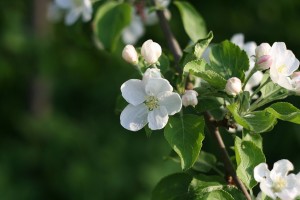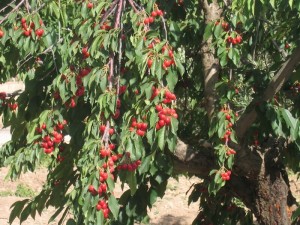 One of the most frustrating things that can possibly happen to someone who has slaved for hours and hours in growing a fruit tree is the unexplainable barrenness that can sometimes occur when there should be a plethora of fresh fruit. I know this from experience. My neighbors all consider me the gardening guru because of my extensive knowledge. But this is only because gardening has been my passion for years and years, and like a sponge I have accumulated so much information in my mind. My learning has also come from past experiences with failure. For about 5 years after I started planting fruit trees, I did not see a single fruit for all my labor. I was nearly ready to give up, until I met who I think is truly the guru of gardening.
One of the most frustrating things that can possibly happen to someone who has slaved for hours and hours in growing a fruit tree is the unexplainable barrenness that can sometimes occur when there should be a plethora of fresh fruit. I know this from experience. My neighbors all consider me the gardening guru because of my extensive knowledge. But this is only because gardening has been my passion for years and years, and like a sponge I have accumulated so much information in my mind. My learning has also come from past experiences with failure. For about 5 years after I started planting fruit trees, I did not see a single fruit for all my labor. I was nearly ready to give up, until I met who I think is truly the guru of gardening.
I was in the gardening store, looking for some sort of new fertilizer to put my hope in for my quest to obtain fruit. I don’t know if there was a look of desperation in my eyes, but a kindly old man came up and started speaking with me. He introduced himself as Ralph, and for some reason I opened up to him and told him about all of my difficulties. I’ve never been the type to spill all my problems on anyone who asks, but Ralph seemed like such a nice fellow that I just couldn’t help it. And I’m glad I did, because what he taught me truly helped me to get my fruit trees in gear and start producing.
I learned that generally, the inability to produce can be caused by a number of factors. Sometimes the tree is simply too young; If your tree is less than four years old, you shouldn’t exactly expect it to be producing yet. If it has reached 4 years and you still have seen no sign of fruit, then you should start to consider other factors that might be causing the barrenness.
If the tree is undergoing any type of water stress (this can be poor drainage, too much water, or too little water), then it will have trouble growing. If you suspect this is the case, you should evaluate your own watering techniques and compare them with the needs of the tree to see if you are causing water stress. Also always be on the lookout for any diseases or pest damages. If your tree is constantly being molested by all kinds of little creatures, then you can’t expect it to be lively enough to produce fruit.
If your tree blooms but still doesn’t produce any fruit, this could be because of cold temperatures during the bloom. The coldness damaged the flower bud or damaged the baby fruit. Aesthetically the tree may look fine, but the inside could be damaged beyond any hope of ever seeing fruit. Unfortunately there isn’t much you can do in this case except for wait until next year and hope that it doesn’t happen again.
If the tree’s pollination process has not been fully completed, it could have troubles growing fruit. If you planted different varieties, you may find that the requirements are different than you had originally thought and they were incompatible. In this case you need to replant the correct combinations.
Once I evaluated the conditions of my tree and everything that has occurred in its life, I realized that not only had I cross pollinated slightly incorrectly, but I was also giving my tree too much water. After I fixed these problems, I had learned my lesson and I have not had any trouble bearing fruit since then.
So if you are struggling with a plant that is not being cooperative, you should consult an expert gardener. If you can find a gardening mentor like mine that is willing to teach you everything they know, then you should be able to get your garden on the right track with no problems.
Find out more about growing a wide variety of fruit in my “Growing Fruit : The Complete Guide To Growing Fruit At Home” book available in paperback and on the Kindle at Amazon.
























